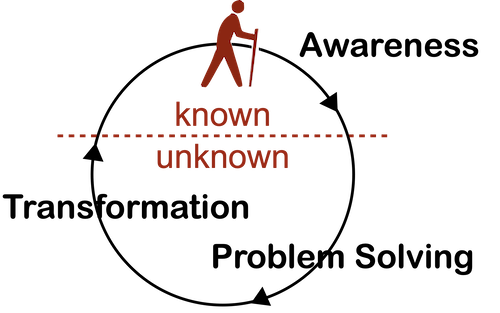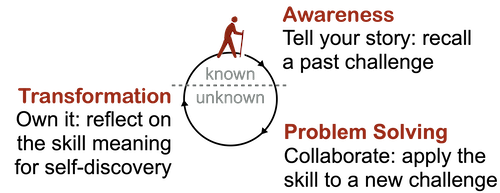Background
Resilience encourages using positive-coping skills to manage stress in an optimal way. Our objectives are to develop social support systems, positive-coping skills for resilience, self-esteem, self-efficacy (believing you are capable of reaching a goal), and problem solving skills. An entirely educational approach is used for learning resilience using the theme of the "Hero's Journey."  Common to many epic stories is the hero who, facing a challenge, goes on an adventure, is victorious, and returns as a transformed person. You are the hero in this journey.
Common to many epic stories is the hero who, facing a challenge, goes on an adventure, is victorious, and returns as a transformed person. You are the hero in this journey.
Read the following Why/How/Example Flashcard. Work on answering the questions in the Tell your story, Collaborate, and Own It exercises. Writing your responses will help you to better organize your thinking. You are most strongly encouraged to do the Collaborate exercise with another person so that you become aware of how to work with people within a social support system, people who can work with you on real life challenges. Refer to the workbook for a more in depth look at this skill and its exercises. For more background information on fitness and Strength. More »
Strength Flashcard
Strength grows from proper nutrition, exercise, relaxation and sleep.
- Why: Practicing a healthy diet, physical exercise, relaxation, and good sleep habits improves physical, emotional, and mental well-being. When you feel good, challenges are more easily managed. Strength is about good self-care.
- How: Find and practice plans for diet, exercise, relaxation, and sleep to fit your lifestyle while meeting the goals of good nutrition, aerobic exercise, stress reduction and adequate sleep.
- Consider your challenge and how it relates to diet, exercise, relaxation and sleep.
- Find and practice a healthy diet that fits your lifestyle yet lowers your health risks. Consider researched plans such as MyPlate, Healthy Eating Plate, Mediterranean, and DASH (Dietary Approaches to Stop Hypertension).
- Find and practice a physical exercise plan that fits your lifestyle and provides at least 2 hours and 30 minutes of moderate-intensity aerobic physical activity ideally spread evenly throughout the week.
- Find and practice a relaxation exercise, such as slow diaphragmatic breathing, progressive muscle relaxation, social resilience, and mindfulness-based stress reduction.
- Practice good sleep hygiene by keeping a consistent sleep–wake schedule, exercising daily and eliminating long naps and naps within a few hours of bedtime.
- Example: I get anxious before and during high-stakes tests and that prevents me from doing as well as I could do. I need to find and practice a relaxation exercise.
- My challenge is to be relaxed before and while taking tests.
- I consider an easy relaxation exercise, such as diaphragmatic breathing, an exercise of slow controlled breathing. I put one hand on my chest and the other on my stomach. I breathe slowly so that the hand on my stomach moves up and down. I try to keep the hand on my chest from moving up and down. Each time I exhale, I focus on the word “relax.” Like any exercise I need to practice diaphragmatic breathing for several weeks before I master it. My plan is to practice it for about ten minutes before I go to sleep.
- I also consider an exercise plan to further reduce stress, diet plan to increase my energy, and good sleep to support the relaxation and improve my likelihood of doing even better on the test.
- I adjust or change any of the plans that are not working and monitor the changes.
- Just before a test, I practice diaphragmatic breathing thinking of the word “relax.”
 Hero's Journey
Hero's Journey
-
Tell your story
Think about a time when you used something like Strength to successfully deal with a challenge. Answer the following questions. 1) What was your challenge? 2) How was your challenge related to diet, exercise, relaxation and/or sleep? 3) What made you feel you were successful meeting the challenge?
-
Collaborate
Work with a companion and consider a real challenge you, your companion or someone you know is currently facing by applying the Strength skill. Answer the following questions. 1) What is the challenge? 2) What abilities or qualities does your companion have that can help with the challenge? 3) How is your challenge related to diet, exercise, relaxation and/or sleep? 4) What is your goal? 5) What are the steps needed to reach your goal?
-
Own it
Reflect upon the Strength skill and describe the skill in a few of your own words. You are adapting the meaning of the skill to be more useable and memorable.
 Common to many epic stories is the hero who, facing a challenge, goes on an adventure, is victorious, and returns as a transformed person. You are the hero in this journey.
Common to many epic stories is the hero who, facing a challenge, goes on an adventure, is victorious, and returns as a transformed person. You are the hero in this journey. Hero's Journey
Hero's Journey